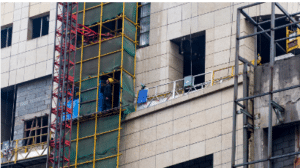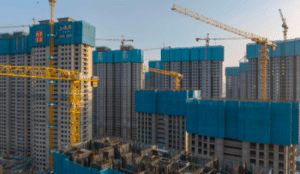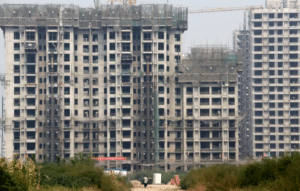Keywords: China property market, Bill Winters, Standard Chartered, China economy, GDP growth, Beijing stimulus, financial crisis, real estate market, economic uncertainty, Chinese investment climate
China’s property market is grappling with severe challenges, with no bottom in sight, according to Standard Chartered’s CEO.
China’s property market, a critical pillar of its economy, remains mired in uncertainty, with no clear signs of recovery. Bill Winters, CEO of Standard Chartered, recently warned that the market has “not yet completely bottomed out,” signaling continued turbulence for the world’s second-largest economy.

China’s Economic Struggles Intensify
In a recent interview with CNBC, Winters described the investment landscape in China as “difficult.” He pointed to diminished consumer confidence and waning international investor interest, both heavily influenced by the ongoing turmoil in the property sector. “The property market has not yet completely bottomed out, so it’s been a slow grind down,” Winters remarked.
Potential Risks of a Property Bubble Burst
Winters also highlighted the significant risks associated with a potential property market bubble burst, which could trigger a broader financial crisis and lead to more severe GDP contractions. This concern is particularly pressing as China’s GDP growth has already begun to falter. The nation posted a 4.7% growth rate in the second quarter of 2024, down from 5.3% in the first quarter—the lowest since early 2023.
Beijing’s Cautious Approach to Stimulus
Despite these alarming trends, Beijing has resisted the urge to launch a massive stimulus program. Instead, the government has opted for more measured actions, such as reducing loan rates and allowing homeowners to refinance their mortgages. Winters suggests that China’s leadership is wary of repeating the mistakes made by other countries during the first wave of COVID-19, which led to unsustainable debt levels. “Our expectation is that the stimulus will be enough, but not excessive,” Winters noted, predicting a challenging short-term outlook but a fiscally prudent long-term approach.
Market Experts Weigh In
Hao Hong, a partner and chief economist at GROW Investment Group, echoed these sentiments, noting that there are “no signs of strong policy stimulus just yet.” He speculates that China may be holding back on aggressive measures due to structural challenges and ongoing downward pricing pressure in the property sector.

A Prolonged Period of Uncertainty
As China’s property market continues to navigate these turbulent waters, the global economy watches closely. The cautious fiscal strategy employed by Beijing, while potentially uncomfortable in the near term, could be crucial in preventing a deeper economic spiral. However, the road to recovery remains uncertain, and all eyes are on how China will navigate these complex challenges.
China’s property market is in a precarious position, with significant risks still looming despite various government efforts. The sector, which makes up around 30% of China’s GDP, has seen over two-thirds of its top developers default on their debts in the last two years. Even with some developers making last-minute payments, the industry’s massive debt burden remains a critical issue. China’s cautious approach to stimulus has not yet reversed the downward trend, raising concerns about broader economic impacts both domestically and globally.






